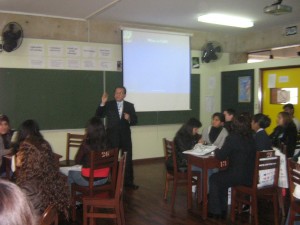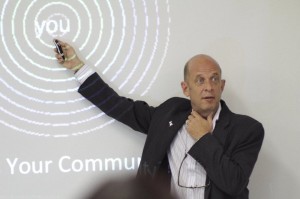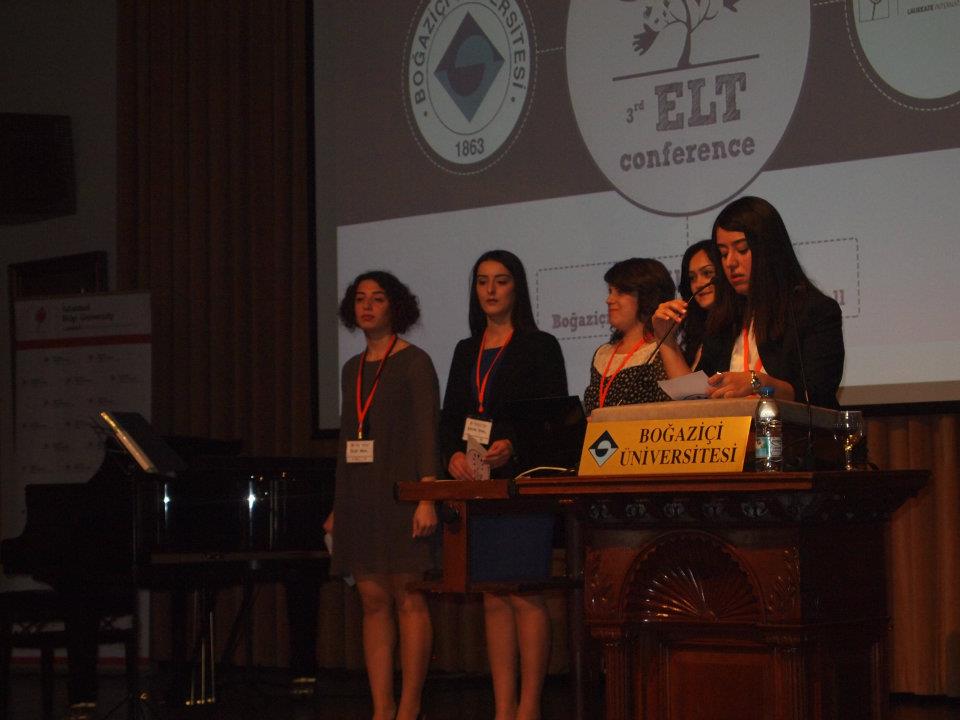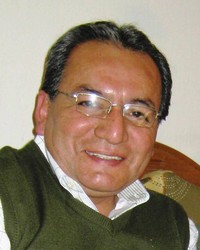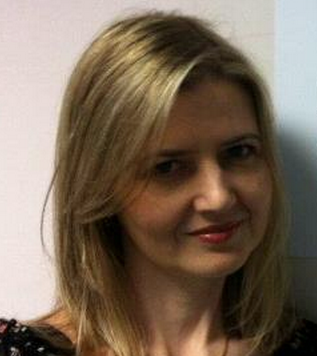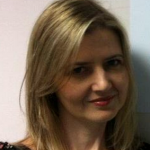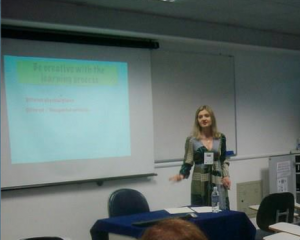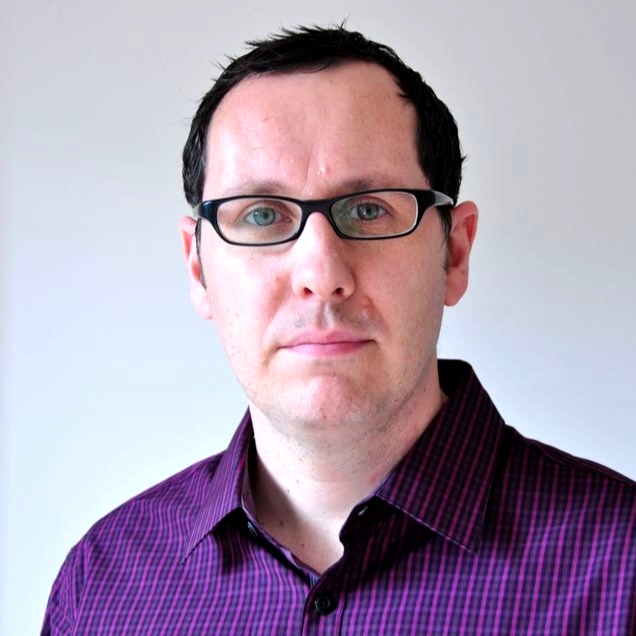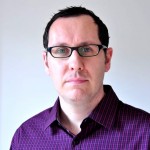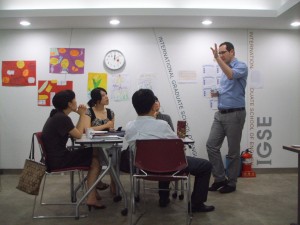Victor Hugo Rojas B – Peru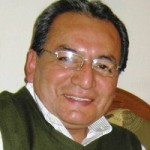
Victor Hugo Rojas B. is a teacher trainer and educator with more than 26 years of experience. He is associate professor of the Didactics of TEFL at U.N.E. He currently lives and works in Lima, Peru. He is passionate about language teacher training and development, and learning technologies. He believes, fervently so, that teachers must be trained through teaching practice, facing challenges, and creating new methodologies. He is the founder of PETsNet. Also, he is a blogger, twitterer, facebooker, and moodler. Networking is one of his passions.
What are you passionate about, Victor Hugo?
I am really an ambitious and critical educator who tries to be outstanding. I think that a well-prepared teacher must be aware of the principles, theories, approaches, methods, techniques and strategies in language teaching and learning. For this reason, I am extremely passionate about teaching pre- and in-service teachers how to discover, create, plan, utilize, and integrate teaching methodologies and strategies in their EFL lessons. English teachers must acquire an array of strategies to address and meet the students’ learning styles, expectations, and needs. Teaching a foreign language takes more than a common curriculum and tests. It is an ongoing process of researching, and trial and error procedures. Since language students need to learn to take control of their own learning, English teachers should be the facilitator who keeps students on the right path towards communicative competence.
I am also passionate about integrating technologies in teacher training and teacher development courses. As a course developer, I am currently applying my knowledge of ICT and distance/blended learning in running and delivering the theoretical contents of Didactics of TEFL using different Web 2.0 tools. Likewise, I am a networked teacher. Thanks to Twitter and Facebook, I have built an extraordinary Personal Learning Network (PLN) with the most prestigious and inspiring ELT colleagues in the world.
How and why did you become a teacher?
I think that I am a born teacher. I have been involved in education service almost all my life. I’ve been teaching more than 26 years in schools, language centers, pedagogical institutes, and universities – mostly in public institutions.
When I was a child and teenager, I used to play teacher with my brother, sister and cousins. But the question is: Who inspired me to decide to be an English teacher? Mr. Percy Rojas was my first teacher of English in the last year of primary school, and Mr. Rodriguez in the last 2 years of secondary school. When I finished school I decided to study teacher education in the university where I am currently working. Because of a temporary closure of the university, my studies were postponed for about 3 years. Fortunately, I studied English in a language school while the university was closed. My official teaching career started in 1983, teaching English to kindergarten, primary, and secondary students. Great memories!
What are you most interested in right now, Victor Hugo?
Actually, I am most interested in becoming an online mentor of novice and experienced English teachers worldwide. That is the main reason I joined http://iTDi.pro . I am sure that the professional experiences I gained, up to now, can be shared and help enrich those in similar contexts — where ever there are programs for new English teacher and where ever English is taught as foreign language. Nevertheless, in terms of my own professional development (PD) I must continue pursuing a Master degree in TEFL/TESOL/Applied Linguistics. I have never been to an English-speaking country. Meanwhile, I will continue working, delivering lessons, mentoring, and training teachers while looking for opportunities. Although I did a Master course in Higher education and in fact just finished it, I am very disappointed in the quality of post-graduate courses in some institutions in Peru. However, I had to do it to keep my job. I hope this will change, but it would be a bit complicated to study and work in my country since I have to work in different institutions.
What things do you do to help you get better at being a teacher?
I think learning is personal decision. I’ve pursued my own professional development in an autodidactic way. I have pursued Certificate and Diploma courses, but mostly I’ve attended conferences, congresses, and workshops.
The highlight of my involvement in English teacher training and development came when I joined a group of English teachers at the ESS Project supported by the Ministry of Education of Peru and the British Council. I was trained to be an English Teacher Trainer attending intensive courses on TEFL. In 1993, I started training in-service state school English teachers in Cusco. It was one of the most challenging experiences I have ever had. Since that moment I have known that my business was to be an English teacher trainer and educator.
What helps me get better at being a teacher is taking risks by teaching different courses to children, teenagers, and adults in-site and online. My most challenging experiences are when I attend conferences, congresses, and seminars, and give talks and workshops at national and international ELT events.
In addition, I am so grateful to all my virtual mentors. I have in a large list of contacts from Twitter, Facebook, Ning, and so on. People like Shelly Sanchez Terrell, Marisa Constantinides, Barbara Sakamoto, Michael Krauss, Graham Stanley, Nicky Hockly, Nellie Deutsch, Nik Peachey, Mbarek Akaddar, Hieke Phil, Vance Stevens, Evelyn Izquierdo, Russell Stannard, and Chuck Sandy are among the extraordinary colleagues in my network.
What’s the biggest challenge you face as a teacher?
My biggest challenge is to train qualified English teachers to help to improve the Peruvian educational system. Since this new generation of students has had more demanding requirements put upon them in order to be competent in the actual globalized world, future English teachers should be able to distinguish among the different approaches and methods in TEFL, apply the theoretical foundations in real teaching situations, create elaborate lesson plans, manage teaching skills and techniques, as well as select and utilize a variety of techniques for evaluation and testing, and demonstrate the effective practice in the use of ICT — at least.
In order to achieve these objectives, the Didactics of TEFL course that I teach is mostly workshop. That is, I will not lecture at teacher students much, except when giving instructions or clarifying something to the group is required. They use my time to assist them individually or in their group. I am active in moving around the class, reading over their shoulder, and answering questions. I teach this way because research shows that it is the best way to run this course. Workshops work better through the use of active and collaborative techniques such as tandem activities, mind maps, controversial discussion, case studies, rallies, jigsaws, forums, museum displays and so on. This is in addition to essays, journal reports, oral presentations, model classes, and virtual interactive activities.
Nowadays, many universities are aimed at selling titles, diplomas, and degrees without making sure students achieve the required competences needed to be a competent teacher. My task is to train pre- and in-service English teachers in deepening their studies of theoretical foundations to be put into practice in order to create their own methodologies.
In spite of a certain indifference on the part of authorities, I think that teacher educators must reflect on their real roles in training teachers.
What advice would you give to a teacher just starting out on a journey of professional development, Victor Hugo?
Actually, since teachers work with human beings, they must be well prepared to interact, socialize, sympathize, and get along with them. Certain personal characteristics are required to be a counselor, facilitator, guide, monitor, evaluator, director, tutor, material developer, and knower. The most important thing a teacher must be is a life-long learner. Teachers never stop learning.
There are a lot of alternatives and facilities available to develop professionally. To empower our PD means taking on-site or online English teachers courses and certificate and diploma programs. It also means joining English teaching associations and e-lists, networking, and attending conferences, congresses, seminars, and webinars. Now, we have another great opportunity: to join iTDi.
Victor Hugo, is there any blog or online link you’d like to recommend?
Nowadays, I think that surfing the Net is a must. Teachers can find a huge number of websites related to TEFL/TESL/TESOL. I would like to invite iTDi Blog readers to visit or join some of my online sites:
Issues Concerning Language Education (Blog): This a corner for reflecting, studying, commenting, exchanging, and interacting on topics related to the teaching and learning of a foreign or second language.
http://victorhugor.blogspot.com/
Peruvian English Teachers Network (Ning): This is an academic and social network that aims to inspire, innovate, empower, & transform all English teachers professional development.
http://peruvianenglishteachersnet.ning.com/
PETsNet (Facebook group): It is a free, community-supported, and non-profit network. We particularly hope that novice teachers will find our network a supportive inspirational.
http://www.facebook.com/PETsNet
PETsNet Times : It is a weekly online newspaper.
http://paper.li/PETsNet/1332657904
What’s your favorite quotation about being a teacher?
“The good teacher discovers the natural aptitudes of his pupils and develops them by stimulating and by inspiring them. The true chief grows the men who follow him” – Stephen Neill
Students’ background, skills, attitudes, and aptitudes should be identified and empowered by teachers through meaningful and active learning experiences that serve as reference for their future life. Most teachers have been really inspired by one or more of their school or college teachers, and have become their followers.
